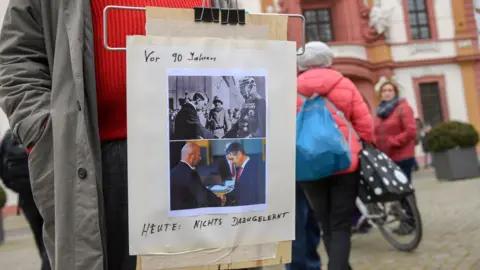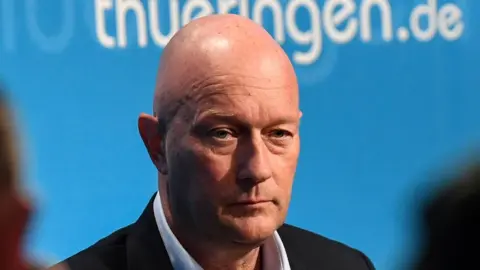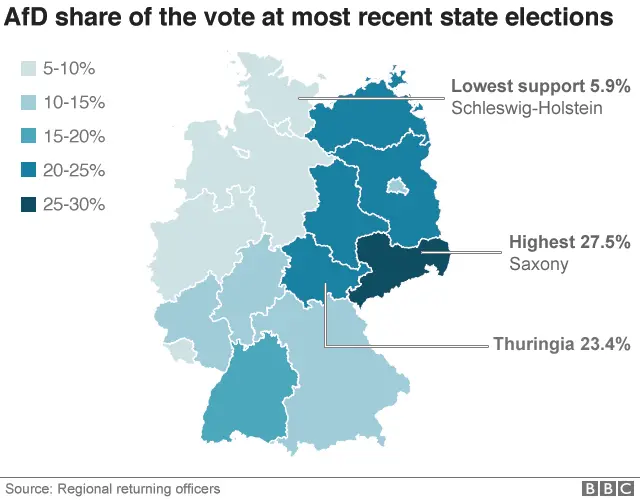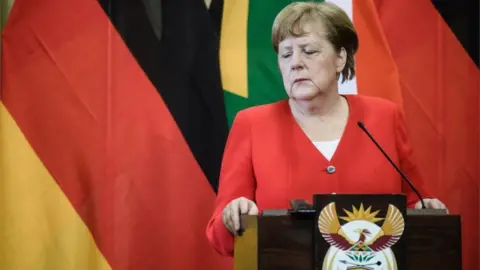Germany AfD: How far right caused political earthquake
 Getty Images
Getty ImagesIn February 1930, Adolf Hitler was in a jubilant mood. "Our biggest success we had in Thuringia," he wrote. "There we are the most significant party. The parties in Thuringia trying to create a government cannot secure a majority without our co-operation."
Germany may have pledged "never again". But 90 years on, the far right has once again played - albeit briefly - the role of kingmaker in the eastern German state.
Thuringia's AfD - led by a man who can, a German court ruled last year, be reasonably described as a fascist - has caused a political earthquake which has brought thousands of Germans on to the streets in the protest.
Until a few days ago, many of those protesters had never heard of Thomas Kemmerich.
The regional politician was, for 24 hours or so, unexpectedly elevated to the role of state prime minister thanks to the support of regional AfD politicians who ignored their own candidate in order to oust existing prime minister Bodo Ramelow who, following inconclusive elections last year, had been widely expected to continue as leader over a newly negotiated left-wing coalition.
After countrywide outrage, Mr Kemmerich stood down. But not before the Free Democrat came to symbolise the vulnerability of what the Germans call the Brandmauer - the firewall which, by decades-long political convention, is supposed to keep the far right from exerting real influence over German politics.
 EPA
EPAFor many it's a mark of national shame that the AfD has found such fertile electoral ground in the former east of the country. It's one of the reasons for the inconclusive election result in Thuringia.
At national level, the party's presence in the Bundestag has coarsened parliamentary debates and, arguably, its campaigns centred around migration and national identity have broken old German taboos and shifted politics to the right, as the political centre struggled to deal with the electoral challenge.


But what happened in Thuringia has sent a particular shudder down the country's spine.
Mr Kemmerich, of the liberal and business-minded Free Democrat Party (FDP), may have voiced his opposition to the AfD. But he took the job anyway - on a majority secured with their support.
Up the federal ladder, FDP chief Christian Lindner initially appeared to accept the result, despite the horrified response of senior members of his party.
Accused of seeking power at any price, Mr Lindner was reminded of his own words when in 2017 he walked away from coalition negotiations with Angela Merkel at federal level saying: "It's better not to govern than to govern badly."
 EPA
EPAAnd the affair has raised uncomfortable suspicions within Angela Merkel's CDU.
The chancellor, who described what happened as "unforgivable", sharply rebuked regional politicians from her own party. They had also voted for Mr Kemmerich, eliciting accusations that - locally at least - the CDU was ready to break a pledge to never join forces with the far right.
The head of Mrs Merkel's CDU, Annegret Kramp-Karrenbauer, will discuss the matter with her coalition partners this weekend. Her ever reluctant Social Democrat partners will no doubt want assurances that the CDU has no intention of working with AfD at any level and that she - and her party - can control its regional politicians.
She herself is under pressure. Having forbidden Thuringia's CDU leader from seeking a local alliance with Die Linke (the Left party), some are unsurprised that the party aligned itself, knowingly or otherwise, with the AfD. The German government is also painfully aware of the changing political landscape - and the part AfD plays within it.
In Thuringia, fresh elections are now expected. Even so, for many, the case has raised painful parallels.
Belgian ex-Prime Minister Guy Verhofstadt was among those who took to social media in protest, circulating a photograph of a newly elected Mr Kemmerich shaking hands with Thuringia's hard-right AfD leader Björn Höcke, and juxtaposing it with one of Hitler greeting the then German president Paul von Hindenburg.
Barely a week ago, this country reflected on the atrocities of World War Two, during commemorations to mark the anniversary of the liberation of the Nazi death camp at Auschwitz.
That the far right has been able to wield such influence, that a mainstream political party accepted its support and that, knowingly or otherwise, Angela Merkel's CDU appeared to align with them is, for many, the source of great shame.
